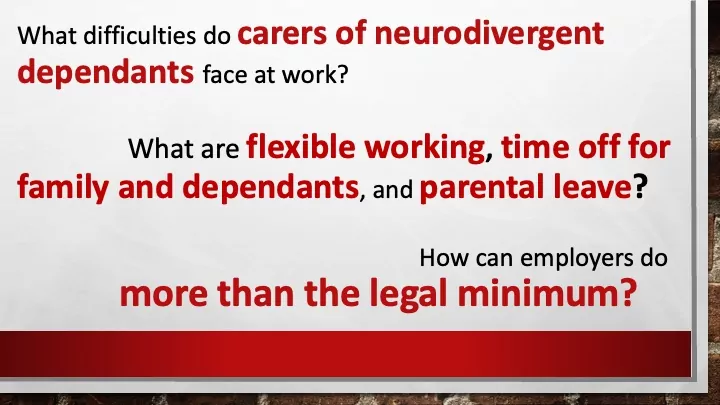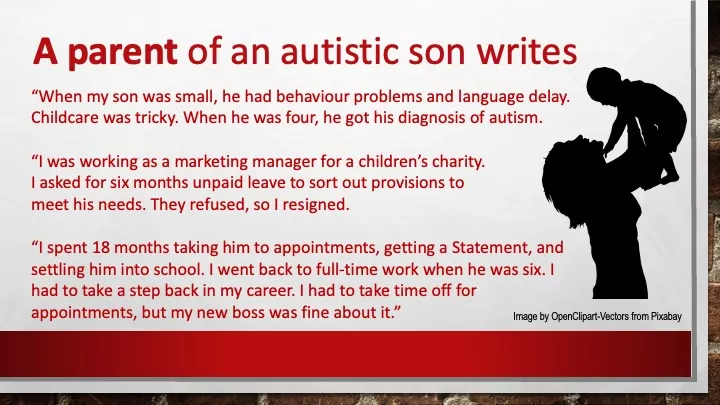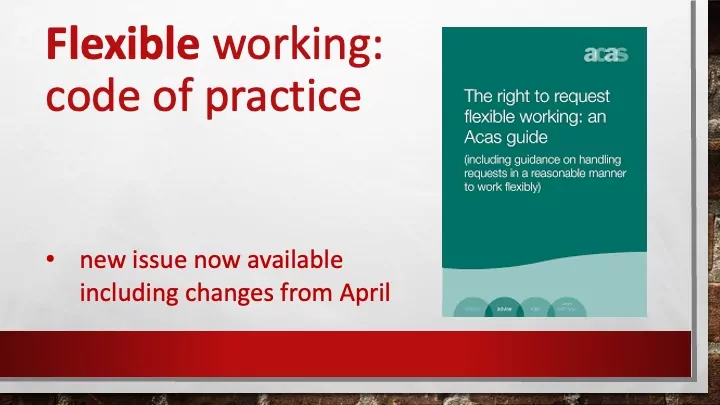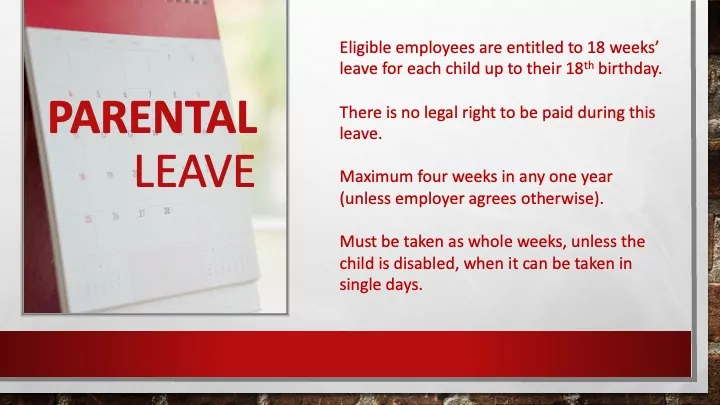Working carers’ rights: flexible working and more: Webinar 7
Working carers’ rights: flexible working and more
On Sunday 25 February, Red in the Spectrum hosted a webinar on working carers’ rights, looking at flexible working and other rights for workers who have caring responsibility for a neurodivergent dependent.
This was the seventh in our series of ten webinars on neurodiversity at work.
This post contains all the material that we presented in the webinar, and some of the contributions from participants.
- What difficulties do carers of neurodivergent dependants face at work?
- What are flexible working, time off for family and dependants, and parental leave?
- How can employers do more than the legal minimum?
A parent of an autistic son writes:
“When my son was small, he had behaviour problems and language delay. Childcare was tricky. When he was four, he got his diagnosis of autism.
“I was working as a marketing manager for a children’s charity. I asked for six months unpaid leave to sort out provisions to meet his needs. They refused, so I resigned.
“I spent 18 months taking him to appointments, getting a Statement, and settling him into school. I went back to full-time work when he was six. I had to take a step back in my career. I had to take time off for appointments, but my new boss was fine about it.”
“I used to work on a railway station.
“I have a young autistic son, Christy. I am a single mum, after the pressures of trying to balance work and parenting broke up my marriage to Christy’s dad.
“A new manager made me work shifts around a roster, which was disruptive for Christy. I became ill with stress. The employer gave me absence warnings. My manager told me, “We are running a business, not a creche.”
“Another manager tried to get me to go part-time, but would not let me do this at a station near my home; and I could not live on a part-time wage.
“They stopped me doing work projects, a secondment and taking promotion. Eventually, I had no choice but to leave.”
Participants’ experiences:
When caring for my daughter (anorexia nervosa and undiagnosed ADHD) and for my dad with Alzheimer’s, I was told I would be moved to a different, more challenging role. I asked not to, as I knew it would be too much for me given the stress I was under. I ended up going under and having a breakdown of sorts and having long-term sickness myself.
Absolutely dreadful and discriminatory. It’s not fair that some emergencies are not covered as compassionate leave (paid) and you have to take unpaid leave.
Thankfully, I have never had to take a lot of time off due to this, but my partner has better conditions in his job than I have had in any of my jobs in the last ten years. My partner gets paid during any appointment we attend for our son. I have gotten time off but have never been paid. My partner also has a better sickness policy when our son needs to be looked after for longer.
Coping with work when my family member is experiencing a manic episode (bipolar disorder and autism) and I’m feeling quite traumatised, stressed and sleep deprived. Lack of support, empathy or understanding from management when experiencing distress such as this.
As a carer of an adult with autism/bipolar, I’ve had a difficult life in work as she was not classed as my dependant.
Flexible working
Flexible working is a change to an employee’s times and/or location of work, to meet their personal needs.
All employees have the legal right to request flexible working.
Employees can request a change to:
- the number of hours they work
- when they start or finish work
- the days they work
- where they work.
Flexible working: examples
Examples of flexible working include:
- job sharing
- remote working / working from home
- hybrid working
- working at a site closer to home
- part-time working
- compressed hours
- flexitime
- annualised hours
- staggered hours
Flexible working: code of practice
The ACAS code of practice on flexible working is here.
A new issue is now available including changes to flexible working rules from April 2024.
Flexible working: eligibility
Employees must have worked for the same employer for at least 26 weeks to be eligible to request flexible wokring.
From 6 April 2024, employees will be able to request flexible working from their first day in a new job.
Employers must deal with requests for flexible working in a ‘reasonable manner’, for example:
- assessing the advantages and disadvantages of the flexible working application
- holding a meeting to discuss the request with the employee (and their companion eg. union rep)
If the employer does not handle a request foir flexible working in a reasonable manner, the employee can make a claim to an employment tribunal.
Refusing flexible working
An employer may refuse an application if it has a “good business reason” for doing so:
- extra costs that will damage the business
- inability to reorganise work
- inability to recruit a person to do the work
- effect on quality and performance
- inability to meet customer demand
- lack of work to do during the proposed working hours
- planned changes to the business
Flexible working: process
- The employee writes to the employer, requesting flexible working.
- The employer considers the request and makes a decision within three months (or longer with the employee’s agreement) – two months from 6 April 2024
- If the employer agrees, it changes the terms and conditions in the employee’s contract of employment.
- If the employer does not agree, it writes to the employee giving the business reason for refusing.
Flexible working: once or twice a year
The employee may only make one application for flexible working in any 12-month period – from 6 April 2024, two applications in any 12-month period.
Employers may ask employees to apply on a standard form, or may accept applications by email or letter.
Flexible working: what to include in the application
The application for flexible working must include:
- the date
- a statement that this is a statutory request
- details of how the employee wants to work flexibly and when they want to start doing so.
- an explanation of how they think their flexible working might affect the business and how the business might deal with this
- a statement of whether and when the employee has made an application previously.
Flexible working: limitations
- only applies to employees (not other workers)
- only a right to ask, not a right to get.
Recommendation
If you are yourself neurodivergent (or otherwise disabled), and you want to change your hours or location of work, ask for this as a reasonable adjustment rather than as flexible working, as you are on stronger ground legally. You have the right to have reasonable adjustments; you only have the right to ask for flexible working.
Contribution from participant
I had ACAS tell me on the phone it would need to be requested under flexible working and not reasonable adjustments when it was for me due to disability.
[Note: This sounds like poor advice.]
Flexible working: build on the legal minimum
- default policy to agree requests
- employ enough staff to allow flexibility
Flexible working: example of where it would help
“A union member I represented is the main carer of a young adult with a learning disability and autism.
“The member was having problems getting leave for specific things, such as community dentist appointments, even when the leave was recommended by the professionals who were supporting her.
“Her daughter is picked up to go to college, but times vary, and the member needs to be at home until the bus arrives. She needs flexible start times, which should not be a problem in her team.
“When she challenged management with union support, they backed down.”
Time off for family & dependants
- Employees may take time off work to deal with an emergency involving a dependant.
- A dependant is a spouse, partner, child, grandchild, parent, or someone who depends on you for care.
- You may take a ‘reasonable’ amount of time off to deal with the emergency.
- There is no limit on how many times you can take this time off.
- Your employer may talk to you if it thinks the amount of time off is affecting your work.
Time off for family & dependants: unpaid
Your employer does not have to pay you while you take this time off.
Time off for family & dependants: examples of emergencies
- injury, accident or assault
- disruption of care arrangements
- a child being involved in an incident at school.
Time off for family & dependants: build on the legal minimum
- pay employees during time off
- entitlement for all workers
- compassionate leave
- workplace childcare
Parental leave
- Eligible employees are entitled to 18 weeks’ leave for each child up to their 18th birthday.
- There is no legal right to be paid during this leave.
- Maximum four weeks in any one year (unless employer agrees otherwise).
- The leave must be taken as whole weeks, unless the child is disabled, when it can be taken in single days.
Parental leave: eligible employees
Eligible employees are those who:
- have worked for the employer for more than a year
- have responsibility for a child aged under 18
- are named on the child’s birth or adoption certificate; or have or expect to have parental responsibility
- are not self-employed or other type of worker who is not an employee
- are not a foster parent of the child.
Parental leave: notice
- Employees must give 21 days’ notice before their intended start date.
- Employees must confirm the start and end dates in their notice.
Parental leave: postponement
The employer may postpone the leave if:
- it has a ‘significant reason’ eg. business disruption
- it is not immediately after the birth or adoption of a child
- it does not delay the leave until after the child’s 18th
If the employer postpones the leave, it:
- must write explaining why within seven days of the request
- must suggest a new start date, which must be within six months of the requested start date
- can not change the amount of leave being requested.
Parental leave: build on the legal minimum
- Extend eligibility to all workers.
- Extend eligibility to carers of adult dependants.
- Pay employees during parental leave.
Parental leave: Contributions from participants
My current workplace gives a week of carer’s leave and a week of compassionate: both are paid.
My manager took nearly two months (and around three weeks before I wanted to take it) to turn down my parental leave for January and suggested I take it in April. I’ve no idea why they took so long. They also wanted to know more details about why I wanted it, even after telling them it was to spend time with my autistic son.
Parental leave: example
Sandra and Jack have an eight-year-old autistic son and two other children, one older, one younger.
Both Sandra and Jack work for the same company, Sandra on weekdays and Jack on a roster on which he works four out of every seven Saturdays.
Their son has started attending music therapy on Saturday mornings. Both parents need to be off work so that one can take their son to therapy and the other can look after the other two children.
The only way they can do this is for Jack to take unpaid parental leave when he is rostered to work on Friday overnight or Saturday morning.
It can be a battle
An example of a successful campaign for an employee’s flexible working:
Sanjay works in a ticket office and has a young autistic daughter who needs a stable routine. One week, he works early shift, the next week lates, etc, and his daughter gets distressed.
He asked for regular hours. His manager was hostile. She agreed to fixed hours for a short period but undermined it.
Union members ran a petition of his workmates supporting Sanjay’s fixed-hours arrangement. The case was reported to the union branch, where members said they were willing to strike in support of Sanjay.
When the manager failed to follow the policy and tried to cancel the fixed-hours arrangement, the union appealed to a higher-level manager, and got Sanjay’s hours restored to what he needed.
Following this webinar on working carers’ rights: flexible working and more, there are three more webinars in the series – you can attend whichever ones are most interesting and relevant to you.
Whether you attended this week or not, we hope to see you at some point over the next four weeks.
Next week’s webinar is on Neuro-inclusive Recruitment. Register here.










